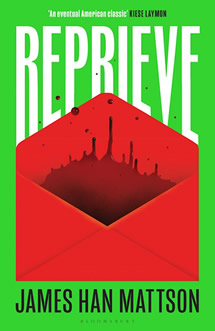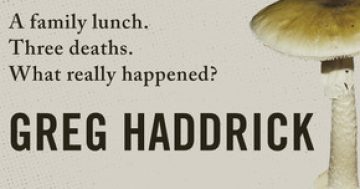Reviewed by Robert Goodman.
By James Han Mattson, Bloomsbury.
 James Han Mattson’s second book Reprieve is an odd combination of styles, genres and themes wrapped in a bizarre premise. It is part courtroom drama, part coming of age story, part love letter to the horror genre and all mixed with a healthy dose of political commentary. Unfortunately, it ends up being less than the sum of all of these disparate parts.
James Han Mattson’s second book Reprieve is an odd combination of styles, genres and themes wrapped in a bizarre premise. It is part courtroom drama, part coming of age story, part love letter to the horror genre and all mixed with a healthy dose of political commentary. Unfortunately, it ends up being less than the sum of all of these disparate parts.
The book opens with a courtroom transcript. Someone has died in something called Cell Five. There is some sort of game, a number of names are mentioned but it takes a while for readers to work out who all of the players are and what those names mean. The narrative moves quickly to backstories of some of the people named. This includes Kendra, a teenage Black girl whose mother moved her from Washington to Nebraska where she gets a job at a full contact horror experience called Quigley House, Jadiee a young Thai man who falls in love with his English teacher and moves to study in America in order to track him down and Leonard, a hotel manager who finds and loses the love of his life.
In and around these stories is the story of Quigley House, run by a man called John Forrester. Quigley House is an extreme form of horror-themed escape room experience. Players in teams of four have to progress through five “cells” collecting envelopes as they go. In each cell they have a time limit to collect the necessary envelopes and are confronted by some gory scenario and a new set of evil characters who can beat and electro-stun them while they are not allowed to fight back. The reason anyone goes through this – the promise of a $60,000 prize if they can get through all challenges, a feat only achieved once in the history of Quigley House.
Reprieve is a strange, disjointed narrative. Switching between court transcripts and evidence, the histories of some of the characters, and the playing of the actual game. And while Mattson clearly has things to say about issues like capitalism, racism, misogyny, sexuality and relationships, the message is muddied by the medium. None of the characters are interesting enough to carry the story, so readers are unlikely to care about whether they succeed or who dies or why, and the whole scenario just does not make a lot of sense. The final reveal about how the situation was set up is not particularly well justified either.
James Han Mattson, like a few of the characters in Reprieve, clearly loves his horror and the many good and bad tropes that come with the genre. But a good horror story makes you care about the characters, to root for them as they battle whatever evils have been unleashed, whether they are supernatural, or as in this case, dispiritingly human. Reprieve fails to do this and in doing so also fails to carry the deeper messages Mattson was seeking to explore through the narrative.











